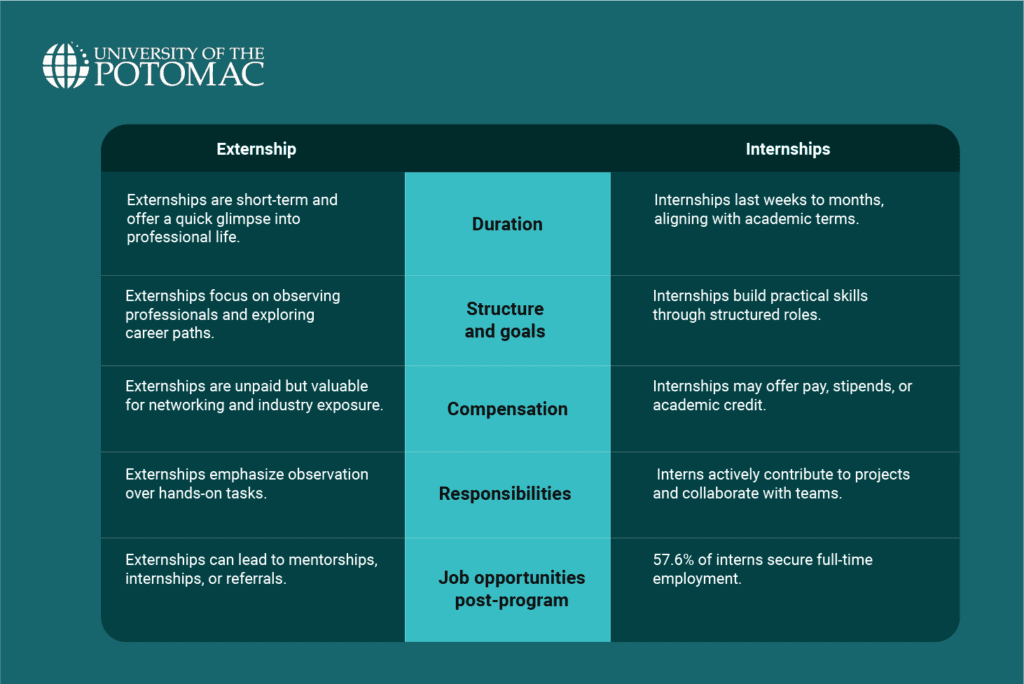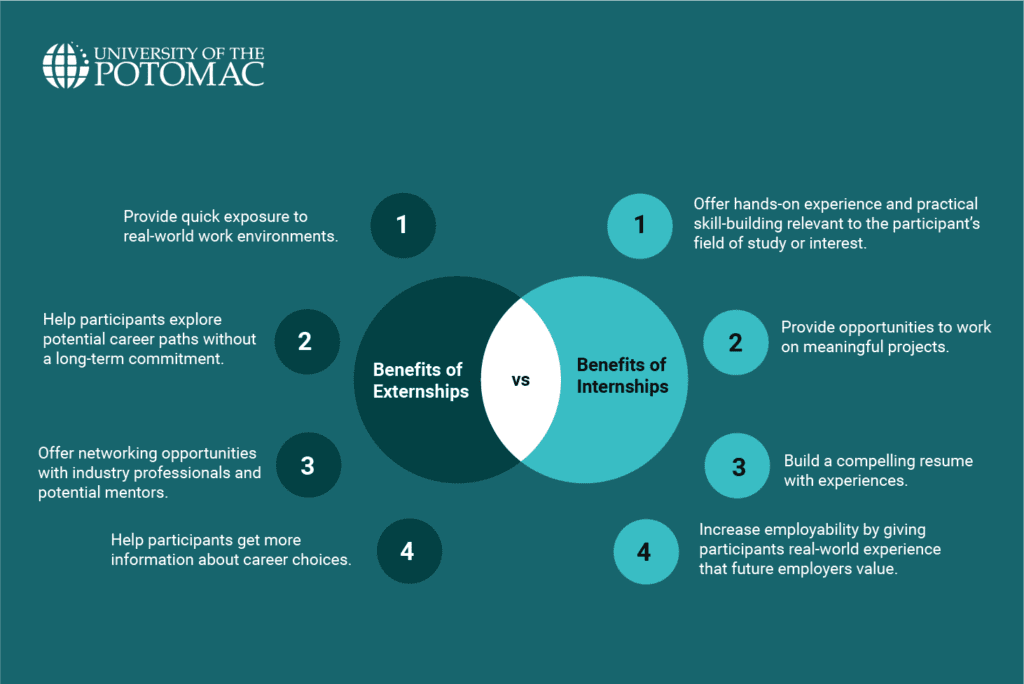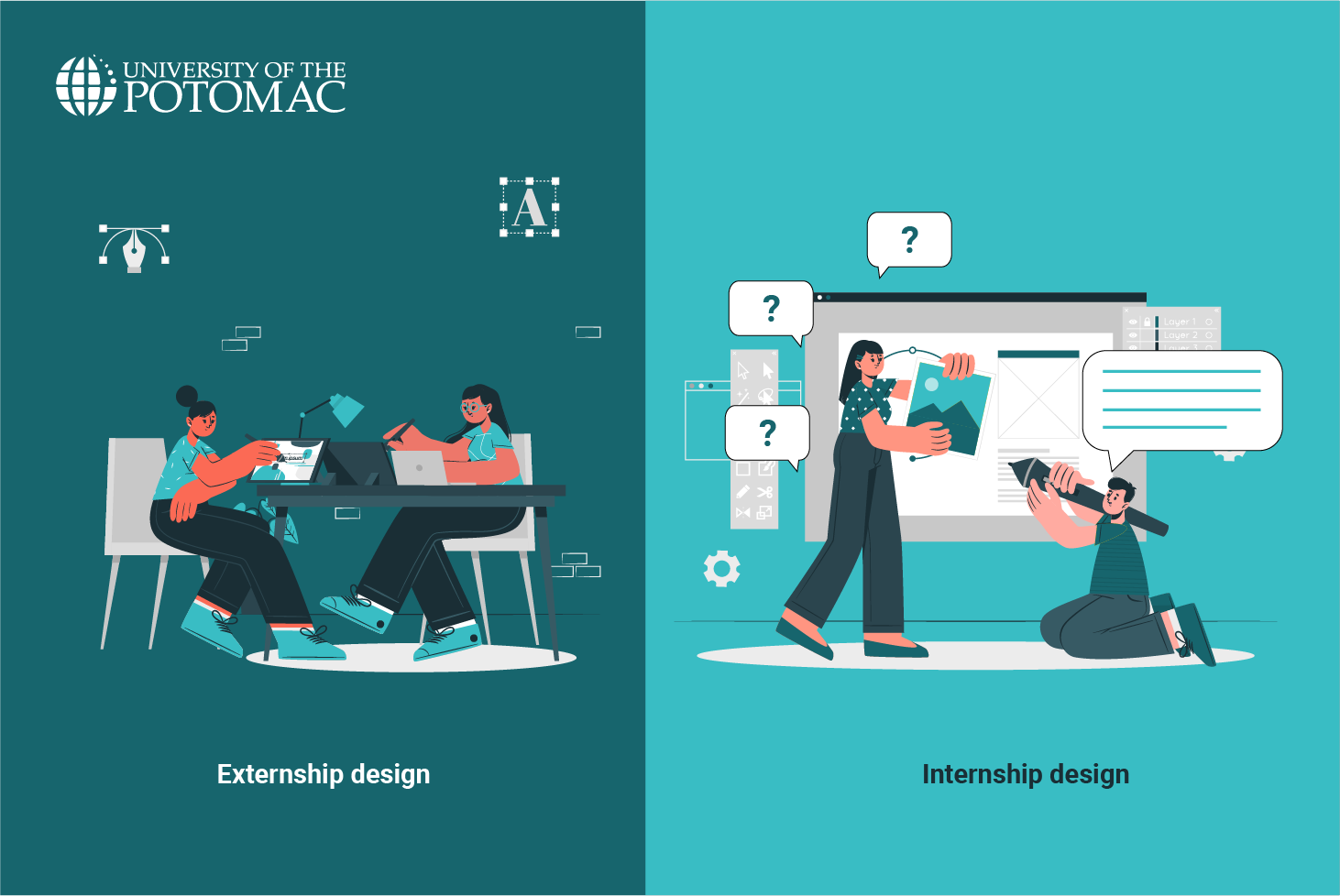Key Takeaways
- Externships offer short-term exposure to the workforce, mainly helping participants learn about career options, build networks, and gain experience without long-term commitments.
- Internships provide practical experience, skill development, and opportunities to work on various projects that increase employability.
- Both experiences are important for future employment, including job references, full-time employment, or mentorship.
The professional world can be overwhelming and stressful for graduates starting their careers, and often, it requires prior practical experience. Externships and internships are two popular pathways to gain this experience. Both provide valuable opportunities to learn and grow, yet they differ in structure, purpose, and results.
In this blog, we’ll explore key differences between externships and internships, their advantages, and how to decide which one is right for you. Whether you are a student, recent graduate, or career-changer, understanding the difference between these two can help you make a reasonable decision on your next chapter. Follow along to explore and find out!
What Is an Externship?
An externship is a short-term experiential learning opportunity designed to help participants explore more about their chosen field of study. Unlike internships—which include firsthand tasks—externships primarily focus on observing. Participants shadow professionals in their field of work, which allows them to see what a typical day in the field looks like, explore industry practices, and experience the overall work environment.
Externships may typically last a few days or a few weeks, making them an ideal choice for students exploring career paths without a long-term commitment. Participants can better understand the skills and knowledge required in their industry, as well as gain insight into career opportunities.
What Is an Internship?
An internship is a structured, longer-term program that allows participants to contribute to the workforce through real projects or tasks. Internships focus on direct and active involvement with the field, where they can gain practical skills and experience.
Internships can last from several weeks up to several months. This experience helps participants build their professional skills and offers a better understanding of workplace dynamics, industry expectations, and career development.
Internships are seen as a step towards future employment by offering networking opportunities and chances to contribute to a company. For example, students who are interested in becoming medical assistants can apply their skills and knowledge to practice through internships.
Key Differences Between Externships and Internships

Externships and internships provide you with the opportunity to learn and grow in your professional and personal life. While they share some similarities, they differ in several key aspects, including duration, structure and goals, compensation, responsibilities, and post-program job opportunities.
By understanding these differences, you can choose the option that best aligns with your career goals and interests.
Duration
Externships are short-term experiences that could last a day or a few weeks. They are designed to help you quickly understand the key concepts of professional life and workplace dynamics.
On the contrary, internships are longer-term commitments that span several weeks to several months. The average internship lasts around 18.3 weeks, or 1,038 working hours. These programs often align with academic terms, such as summer internships or semester-long programs. As such, participants become more involved with the workplace dynamics and expectations.
Structure and goals
Externships are loosely structured programs that focus on observing and shadowing professionals in their workplace. The primary focus is to provide participants with a broader perspective of specific fields and explore potential career paths.
In contrast, internships are more structured, as participants have specific job positions, responsibilities, or projects within an organization. The goal of internships is to help participants develop practical skills relevant to their career path. Interns may be evaluated, receive feedback, and deliver a final presentation or report to assess their contributions and growth.
Compensation
Externships are usually unpaid as they do not last long and only focus on observation. Despite the lack of monetary compensation, they offer non-monetary benefits, including networking opportunities, exposure to the industry, and a better understanding of a specific career path.
Internships, on the other hand, can be either paid or unpaid, depending on the industry, program requirements, and employer. Fields such as technology and finance offer more paid internship opportunities through stipends, hourly wages, or salaries. Additionally, a few internships offer academic credit or non-monetary incentives, such as certifications, mentorship programs, or professional development courses.
Responsibilities
Externships require minimal responsibilities, mainly observation. Participants may need to attend meetings, observe daily activities, or engage in informational interviews to learn about the position or field. Externs are not required to perform hands-on tasks or directly contribute to projects, which makes the experience more about learning than doing.
On the other hand, interns undertake more active responsibilities. Such tasks include conducting research, assisting with daily operations, preparing reports, or working collaboratively with other team members on various projects. Interns, oftentimes, have specific goals to achieve during the program, in alignment with the company’s needs.
Job opportunities post-program
Externships offer participants opportunities to identify possible career paths and gain more information about the fields. They understand what their interests in the industry are and show their skills to professionals. In addition, externships can lead to future mentorships, internships, or job referrals.
Conversely, internships offer a direct path to employment. Many companies see internships as a performance evaluation tool that may help them hire interns for full-time positions. Around 57.6% of interns secure a full-time position after completing their internships. Internships help you gain real-world experience that you can include in your portfolio and resume.
Benefits of Externships and Internships

Both externships and internships provide valuable opportunities to develop professional skills, gain real-world experience, and transition smoothly from education to the workplace, each offering unique benefits.
Benefits of Externships:
Externships offer participants quick exposure to real-world work environments, the opportunity to explore potential career paths without a long-term commitment, chances to network with professionals, and insights into specific industries or roles to make more informed career decisions.
Interested in pursuing a degree?
Fill out the form and get all admission information you need regarding your chosen program.
This will only take a moment.
Message Received!
Thank you for reaching out to us. We will review your message and get right back to you within 24 hours.
If there is an urgent matter and you need to speak to someone immediately you can call at the following phone number:
- We value your privacy.
Quick Exposure to Real-World Work Environment: Externships allow participants to experience the workplace settings in a shorter period and explore potential career paths that they find suitable and enjoyable for their life goals.
Networking Opportunities: Participants can connect to many industry professionals and potential mentors, which only broadens their professional network and improves communication skills in the workplace.
Informed Career Decisions: Externships offer more information into specific industries or job roles, enabling participants to build their skills and make reasonable judgments on their career plans and choices.
Benefits of internships
Internships also provide opportunities for hands-on experience, practical skill-building, meaningful and important projects, and increased employability.
Hands-On Experience: Internships allow students to build their practical skills and gain more experience directly related to their field of study or career interests.
Meaningful Projects: Interns may frequently work on impactful projects that they may present in their resumes or portfolios.
Increased Employability: Internships provide participants with valuable hands-on experience that employers highly value, enhancing their qualifications and positioning them for full-time employment opportunities.
Which One Is Right for You: Externship vs. Internship?
Deciding whether to pursue an externship or an internship depends on your career objectives, time availability, and aspirations for your professional experiences. Here is a breakdown of factors to consider before making a decision:
Consider taking an externship if:
- You’re exploring a new field or a career path that aligns with your interests and goals.
- You have limited time and cannot commit to a long-term program, as externships are typically shorter in duration.
- You want quick exposure to the workplace environments and networking opportunities that allow you to connect with experts and potential mentors.
However, you should opt for an internship if:
- Your goal is to gain practical experience, develop your skillset, and prepare yourself for the demands of a specific job role or field.
- You want to work on relevant projects that can enhance your resume and prove your skills to future employers.
- Your aim is for a direct path toward employment, as many companies use internships to assess potential employees before offering them a full-time position.
Ultimately, the choice depends on how you see your career path. Externships are a great opportunity to briefly demonstrate your skills to the industry, while internships offer a deeper understanding of professional day-to-day life and a stronger professional reputation.
Conclusion
While both externships and internships offer opportunities to gain professional experience and prepare for a successful career, they also differ in their structures. Externships offer a shorter period of stepping into various industries, allowing for exploration, networking, and informed career decisions. Conversely, internships provide a more practical approach to work by requesting interns to participate in projects and offering a direct path to full-time employment.
Choosing the right opportunity depends on your education, career goals, availability, and the type of experience you are seeking. Whether you’re exploring career options through an externship or committing to real-world tasks in an internship, both offer valuable skills, connections, and lifelong learning that enhance your career prospects.
Before starting internships and externships, consider exploring study programs at the University of Potomac to lay a foundation for your theoretical knowledge.
Frequently Asked Questions
Can you do both an internship and an externship at the same time?
Yes, you can do both internships and externships simultaneously, as they provide essential information and practical knowledge of various fields. If you are proficient in time management, you can easily accomplish both at the same time.
Do externships and internships count as academic credit?
While internships may count as academic credit, depending on the program or university, externships—on the other hand—are often not counted as academic credit.
Are virtual internships or externships available?
Yes, both internships and externships are available virtually, particularly since the Covid-19 lockdown.










